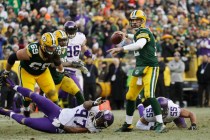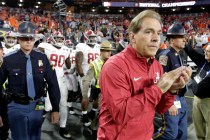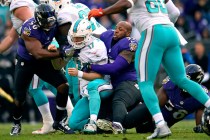LVSC on new path without White
In the middle of the desert, Lee Amaitis and Kenny White, two powerful figures in Nevada’s sports gaming industry, squared off for a Wild West-style shootout. When the smoke cleared, one was going down.
Movie trailers are dramatic like that. But in reality, that’s not how White’s dismissal from Las Vegas Sports Consultants went down.
No parting shots were fired, and, to be honest, the two men did not even exchange words before or after White, LVSC’s former chief operating officer, was let go Aug. 3.
“I’m not going to comment on Kenny’s departure,” said Amaitis, president and chief executive officer of Cantor Gaming, which owns LVSC and operates the M Resort sports book. “It’s not my policy to talk about people no longer in the firm.”
It’s an admirable policy, and White, a highly respected oddsmaker, also is choosing the high road.
“As long as I can remember, the sports gaming industry has been a huge passion for me. For 23 years I’ve devoted every ounce of energy to serving the sports books of Nevada to the best of my ability,” White said. “I’d like to thank the many sports book directors, supervisors and my staff for making it a tremendously rewarding experience.”
White added that he’s “extremely happy” and looking into new business ventures on the other side of the counter. He’s also a candidate to be the next baseball coach at Bishop Gorman High School.
What really happened with White? I’ve been asked numerous times. Call it philosophical differences on how books, and LVSC, should be run.
Amaitis has innovative ideas and desires to see big changes. In his view, he and Mike Colbert, the M sports book director, are leading Cantor’s efforts to carry the state into a more lucrative future.
“I think this town has been at a standstill for 15 years, and that’s what we’re trying to do is change it,” Colbert said. “We’ve only been here a year.
“Some people would say, ‘Wow, they do a big handle. Big deal.’ But we want to write 10 times the business. We want to take $2 billion in bets and hold 2 percent. We’re not an amenity to anyone’s hotel. We’re here to take bets and make money.”
It’s a contentious topic. One industry insider likened Cantor’s plan to George Custer’s charge into the Battle of the Little Bighorn.
Amaitis is ruffling feathers around town, and he’s done it in a short amount of time. Don’t expect him to back down.
“I’m not sure that we’re the most popular kids on the block because we’re trying to make things change,” he said. “A lot of the (book) operators don’t want to talk to me because of what we’re doing. We’re making a big investment in this state. It’s a big, fat check to write. I really don’t understand the criticism of what we’re trying to do.”
The investment Cantor, an affiliate of financial giant Cantor Fitzgerald, made was in developing mobile technology for in-running wagering. Betting on games in progress, Amaitis said, is the future. It turns sports books into the trading floors on Wall Street. Open an account; buy, sell and bet often from a computer terminal or hand-held device.
Cantor has been running a high-volume business at the M Resort, which was buoyed by a successful Super Bowl. Amaitis said his one book is responsible for “close to 15 percent” of Nevada’s $2.7 billion handle for fiscal year 2010. In his opinion, the state’s handle, which shows modest annual increases, should be at least 10 times larger.
“Without being disrespectful to Nevada, a state that has enjoyed a monopoly on sports wagering, it’s not something to be proud of,” he said. “It’s not being disrespectful to casino operators. We want to build a bigger and better model.”
Handle is one goal. The hold, or win percentage, is the bottom line. There might be book operators who are happy to hold 5.5 percent — the state average — on a $50 million handle. Amaitis, who has 35 years experience in the financial services business, is not joining that club.
“That’s not exciting to me,” he said. “I’m not in the 6 percent hold business. I want to be in a couple billion-dollar business that holds 1.5 to 2 percent. I always see the offshore model as competition.
“Let’s put it this way: We don’t lose money. We did not hold higher than 1 percent. My target is 1.5 to 2 percent of our gross. I think we’re on target. The year is not over.”
Rivals are saying Amaitis is trying to reinvent the wheel. That he’s accommodating too many wiseguys, his handle expectations are too high without the benefit of online wagering, and instead of partnering with books to install in-running, he’s conspiring to take over the state.
His in-running technology is at the Venetian and Palazzo, but he said reports that Cantor runs those books are “inaccurate.” Cantor has agreements to assume control of the Hard Rock and Tropicana books.
“There will be more to come,” he said, and he makes references to “super technology” and data collection and algorithmic designs.
“I don’t see the business of sports wagering being any different than a trading market,” Amaitis said. “Cantor brings credibility. I’m not afraid to take a bet. I don’t want to give the impression that we’re gambling, because we’re not. We’re about a value business. The value is in the hands of the bookmaker because people are laying 11-10.”
The NFL regular season is around the corner, so this is when business gets most interesting. Amaitis knows more than algorithms and handles. He can talk football, too.
“There was no chance,” he said, “Brett Favre was going to retire.”
■ BOTTOM LINES — After Favre’s predictable return to Minnesota, adjustments have been made across the board around town. The Vikings’ regular-season win total moved from 8½ to 9½ (minus-110) at the Las Vegas Hilton.
Minnesota is at 4-1 odds to win the NFC and 9-1 to win the Super Bowl. After Favre’s phony retirement report 17 days ago, the Super Bowl odds jumped to about 16-1.
Contact sports betting columnist Matt Youmans at myoumans@reviewjournal.com or 702-387-2907.












